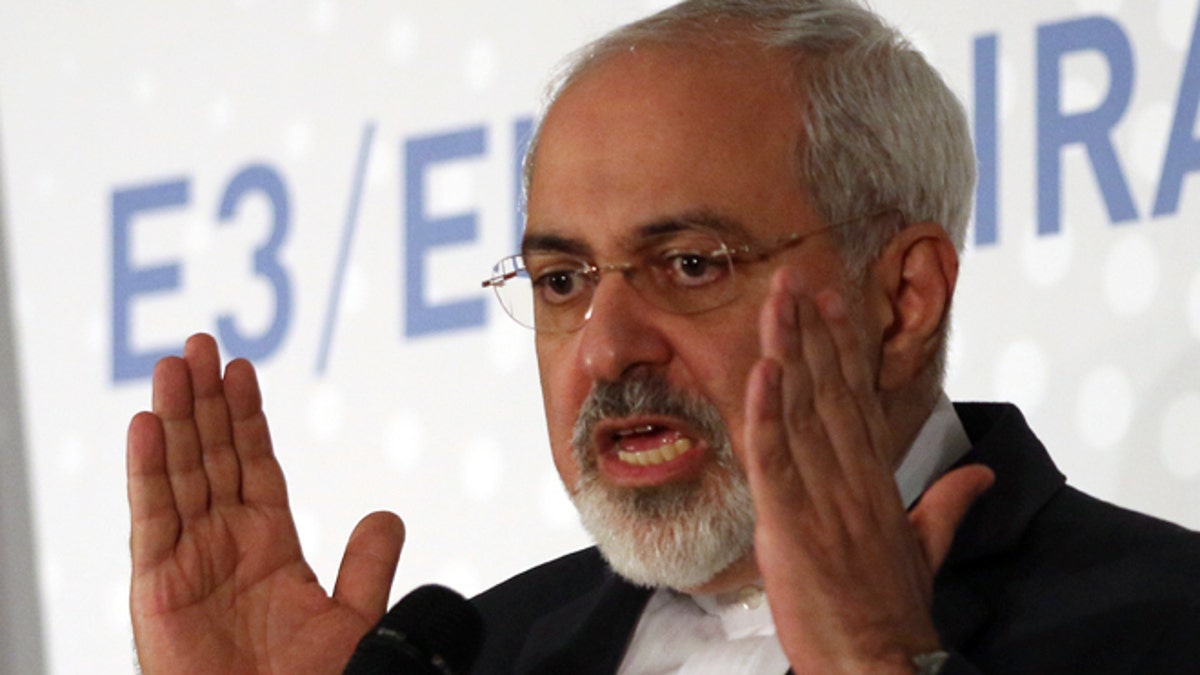
Nov. 24, 2014: Iranian Foreign Minister Mohamad Javad Zarif addresses the media after closed-door nuclear talks in Vienna, Austria. Facing still significant differences between the U.S. and Iran, negotiators gave up on last-minute efforts to get a nuclear deal by the Nov. 24 deadline and extended their talks for another seven months. (AP Photo/Ronald Zak)
Despite an increasingly troubled nuclear negotiating process, evident in yet another extension of the talks between the P5+1 and Tehran, and constant reports of the Iranian regime’s ongoing repression of political dissenters, journalists, and women at home, there remains a strong chorus in favor of working with Iran in the conflict against the terrorists of the Islamic State in Iraq and Syria.
Perhaps the advocates of collaboration think that Iran’s domestic affairs have no bearing on its foreign policy. Or, perhaps they remain convinced that the mere presence of Iranian emissaries at the negotiating table is sufficient evidence of a more reasonable and less anti-Western Iran.
Nothing could be further from the truth.
Iran’s anti-democratic track record and human rights abuses serve to impose a fundamentalist brand of Islam, while its actions across the Middle East aim to spread terrorism.
[pullquote]
On this basis, they are eager to stir up aggression against Israel, to partner with all Islamic terrorists who don’t challenge them directly, and to stand against competing states in the Muslim world, including the U.S.-backed Saudi government. It would be foolish to assume that their designs on Iraq do not fall into this same plan, which is decidedly averse to Western economic and political influence in the Middle East.
In no way do current negotiations over Iran’s nuclear program contradict this broader vision of the Islamic Republic’s foreign policy strategies. Iran seeks relief from crippling international sanctions, to whatever extent that is possible, without making substantial concessions in return.
At their supreme leader’s command, Iranian ambassadors have never budged an inch on central issues related to the regime's uranium enrichment capabilities and potential long-term obligations.
The possibility of a final deal, or at least of one that bears any resemblance to the initial Western intent of the negotiations, now seems very remote. As the Iranian opposition leader Maryam Rajavi said, “The extension of the 12-year-long marathon with clerical regime instead of exercising firmness and tightening the sanctions is tantamount to walking in a tunnel at the end of which there is nothing but a nuclear bomb.”
The current status of that deal, together with a catalogue of current events in Iran, paints a very unfavorable, albeit a quite familiar portrait, of the Islamic Republic. And nothing other than severe naiveté could cause a person to miss the features of that portrait. Unfortunately, such naiveté about Iran is now almost as familiar as the character of the Iranian government itself.
That character hasn’t changed, despite fervent hopes to the contrary. Western observers, including members of the Obama administration, were apparently convinced that the election of Hassan Rouhani to the presidency last year would mark a sea change in Iranian policy toward the West. And since then, every modest suggestion of cooperation has been viewed as confirmation of this assumption. At least, that is the way Western observers have seen it. Iranian citizens have not had the luxury of clinging so tightly to their optimism.
The number of executions has increased under Rouhani’s watch (to nearly 1,000), a major crackdown on journalists has begun in recent weeks, and the population of political prisoners has increased. To be fair, while some of these trends have taken place with Rouhani’s obvious complicity, some of them have been driven by other fixtures of the system. But this illustrates why the past year’s optimism is so unfounded.
The president is not the man in charge of policy in Iran. The Supreme Leader Ali Khamenei, the unelected, virulently anti-American, conservative cleric, is the final authority on all matters of policy. That being the case, the most conservative initiatives of the presidency will always be supported and the most progressive will always be overturned.
This is as true for foreign policy as it is for domestic, and it helps to explain why the nuclear talks are failing and why the Iranian government, under Rouhani or any other president, cannot possibly be trusted as a partner in the fight against a mutual enemy.
One need not look very far to see examples of the aggressive attitude maintained toward the West by the supreme leader and his Revolutionary Guards. They have organized war games to simulate the sinking of American ships; they have claimed victory over economic sanctions in light of the nuclear negotiations; and perhaps most tellingly, they have suggested that ISIS is actually a creation of Western powers.
How naïve must one be to listen to such rhetoric and still believe that Iran will cooperate with the US against an enemy that it has identified with the US. Such faulty attitude has no place in serious policymaking when it comes to urgent global security threats.
Bruce McColm is President of Institute for Democratic Strategies and former Executive Director of the Freedom House.
